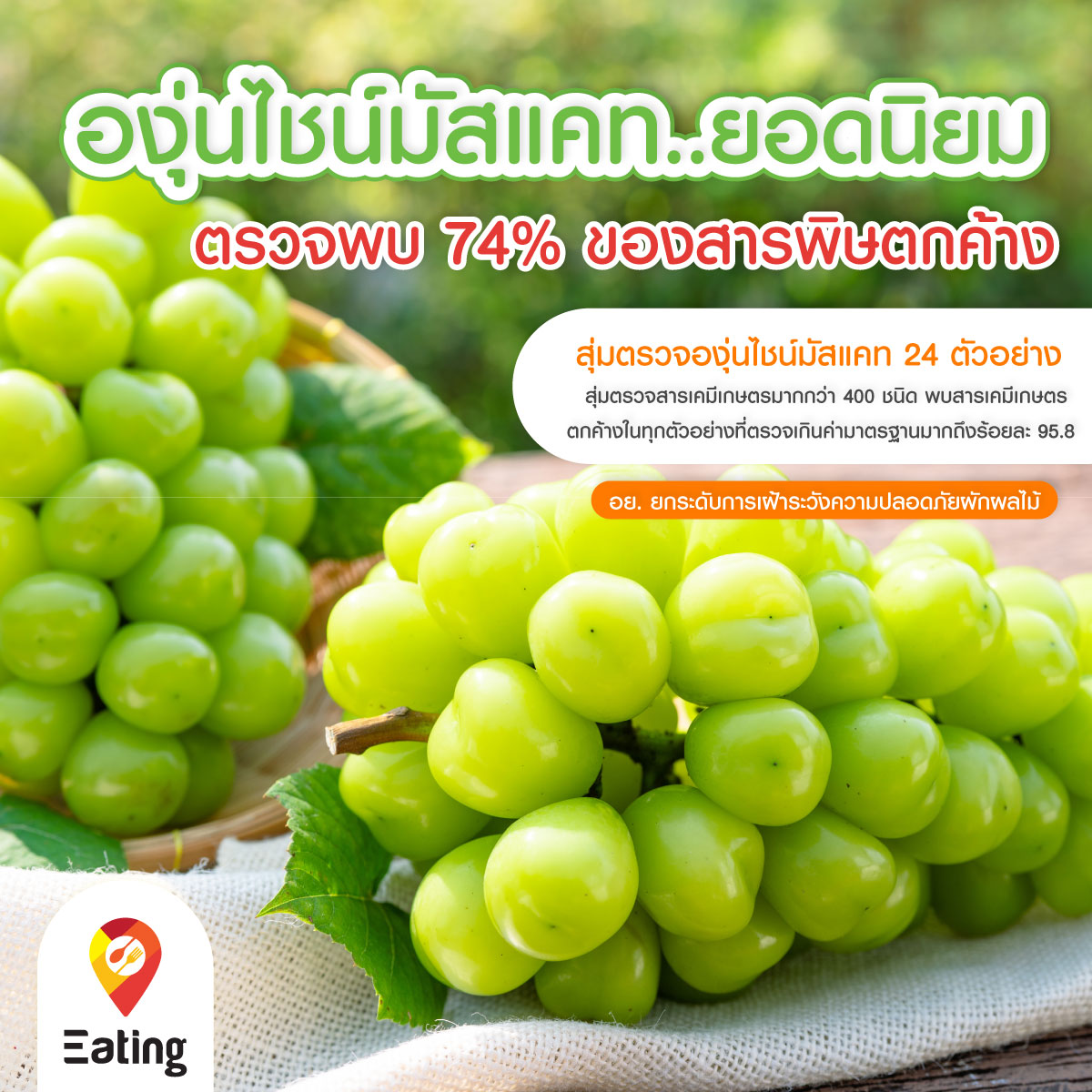Insider
New Experience

องุ่นไชน์มัสแคท..ยอดนิยม
ตรวจพบ74%ของสารพิษตกค้าง
สองถึงสามปีก่อน องุ่นไชน์มัสแคท (Shine Muscat) หรือที่เรียกกันว่า “ไซมัสคัส” จากประเทศญี่ปุ่น ได้รับความนิยมอย่างมากในหลายประเทศทั่วเอเชีย รวมถึงประเทศไทย ด้วยเอกลักษณ์ที่โดดเด่น เปลือกบาง เนื้อแน่น น้ำองุ่นเยอะ รวมถึงรสชาติหวานและกลิ่นหอมของกุหลาบที่ผสมผสานกันอย่างลงตัว ทำให้มันกลายเป็นที่รู้จักในฐานะ “แอร์เมสแห่งวงการองุ่น”
.
ปัจจุบันเราสามารถพบเห็นองุ่นพันธุ์นี้วางขายทั่วไป ตั้งแต่ตลาดสดไปจนถึงรถขายของริมถนน โดยมีราคาที่ลดลงอย่างน่าตกใจ บางร้านขายเพียงกล่องละ 50 บาท และห้างสรรพสินค้าก็มักมีโปรโมชั่น “1 แถม 1” อยู่บ่อยครั้ง เหตุการณ์นี้เป็นผลมาจาก “องุ่นไชน์มัสแคทจากจีน” ที่ล้นตลาด
.
เครือข่ายเตือนภัยสารเคมีกำจัดศัตรูพืช (Thai-PAN) ร่วมกับนิตยสารฉลาดซื้อและมูลนิธิเพื่อผู้บริโภค ได้สุ่มตรวจองุ่นไชน์มัสแคท 24 ตัวอย่างจากกรุงเทพฯ และปริมณฑล โดยตรวจสอบสารเคมีเกษตรมากกว่า 400 ชนิด พบว่าสารเคมีตกค้างในทุกตัวอย่างและมีถึง 95.8% ของตัวอย่างที่มีสารพิษเกินค่ามาตรฐาน ซึ่งนำไปสู่การร่วมมือกับสำนักงานคณะกรรมการอาหารและยา (อย.) เพื่อยกระดับการเฝ้าระวังความปลอดภัยของผักผลไม้
.
ผลการทดสอบเผยว่าใน 24 ตัวอย่าง พบว่า 23 ตัวอย่างมีสารพิษตกค้างเกินค่าที่กฎหมายกำหนด โดยสารพิษที่ตรวจพบมีมากถึง 50 ชนิด ซึ่งในจำนวนนี้เป็นสารประเภทดูดซึม (Systemic pesticide) ถึง 37 ชนิด คิดเป็น 74% ของสารพิษทั้งหมด การล้างสารกลุ่มนี้ออกจากเนื้อเยื่อขององุ่นไม่ใช่เรื่องง่าย
.
สำนักงานคณะกรรมการอาหารและยา (อย.) ได้ดำเนินการเฝ้าระวังคุณภาพผักและผลไม้เพิ่มขึ้น โดยมีมาตรการเข้มงวดสำหรับผู้ส่งออก หากตรวจพบสารตกค้างเกินมาตรฐานถึงสามครั้งในหนึ่งปี หรือสารอันตรายเฉพาะถึงสองครั้งในหนึ่งปีจากผู้นำเข้าเดียวกัน จะมีการพักใช้ใบอนุญาตนำเข้าไม่เกิน 120 วัน ซึ่งเป็นมาตรการที่คำนึงถึงความปลอดภัยของผู้บริโภคเป็นสำคัญในปีงบประมาณ 2568 นี้
------------------------------------------------------
Two to three years ago, “Shine Muscat” grapes, also known as “Shine Muscat” from Japan, gained immense popularity across various countries in Asia, including Thailand. Their unique characteristics—thin skin, firm flesh, abundant juice, and a delightful blend of sweetness and rose fragrance—have earned them the title of the “Hermès of the grape world.”
.
Today, we can find these grapes widely available, from fresh markets to roadside vendors, at surprisingly low prices. Some shops sell them for as little as 50 baht per box, and department stores frequently offer “buy one, get one free” promotions. This phenomenon is largely due to the influx of “Shine Muscat grapes from China” flooding the market.
.
The Thai Pesticide Alert Network (Thai-PAN), in collaboration with the consumer rights magazine “Chalard Buy” and the Foundation for Consumers, conducted a random inspection of 24 samples of Shine Muscat grapes from Bangkok and its vicinity. They tested for over 400 agricultural chemicals and found pesticide residues in every sample, with 95.8% exceeding legal limits. This prompted a partnership with the Food and Drug Administration (FDA) to enhance monitoring of the safety of fruits and vegetables.
.
The test results revealed that out of 24 samples, 23 contained pesticide residues beyond legal limits. A total of 50 different pesticides were detected, including 37 systemic pesticides, which accounted for 74% of all residues. Removing these types of pesticides from the grape tissues is not an easy task.
.
The FDA has stepped up its monitoring of the quality of fruits and vegetables, implementing strict measures for exporters. If pesticide residues exceeding legal limits are found three times within a year, or if a specific hazardous substance is detected twice in a year from the same importer, the importer’s license may be suspended for up to 120 days. This initiative is crucial for ensuring consumer safety in the fiscal year 2025.